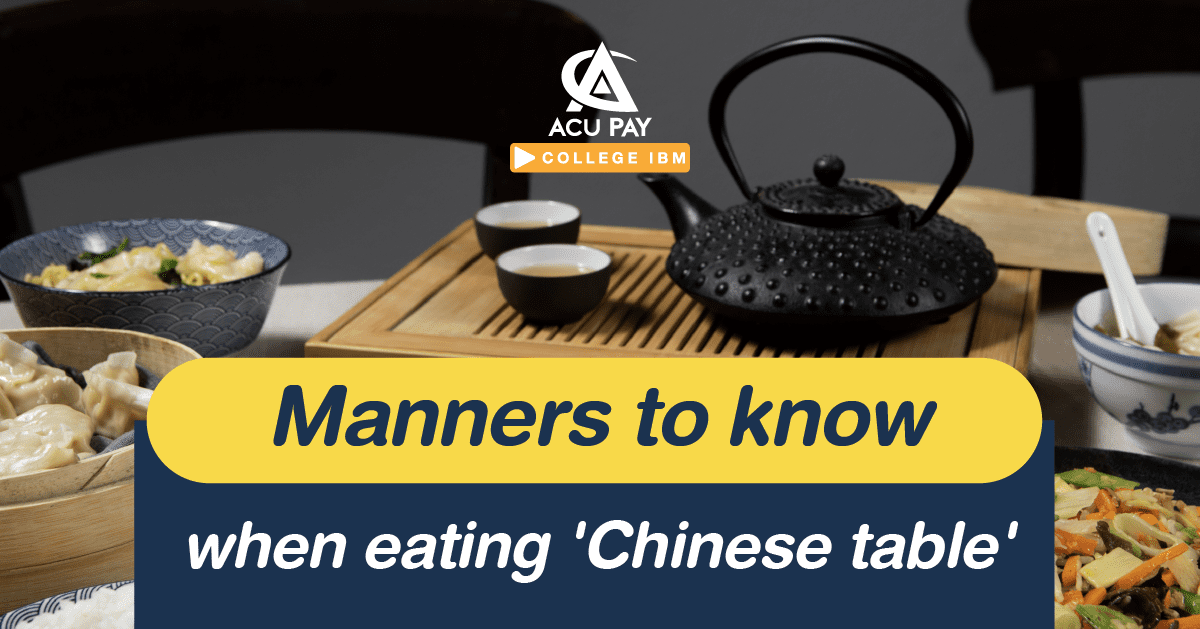

Eating at a Chinese banquet is mostly sitting at a large table together with several people and may be served on a round table that can be turned round and round. This time, ACU PAY will talk about basic Chinese table dining etiquette in case you have a chance to eat Chinese table food so you can follow the traditions.
The following are precautions when dining on a rotating table:
The host or the most senior at the table (both in age and position) will sit opposite the door because they can go to welcome guests when the guests come. The second most senior will sit on the right of the host (or the most senior) and the third most senior will sit on the left of the host (or the most senior). The youngest will sit near the door to conveniently help take care of other guests at the table.
Guests should not eat or drink before the host. You should wait until the host invites all the guests to start eating, then you can scoop the food.
Turn the table clockwise. Start turning the table from where the host sits to the left. You should turn the table clockwise slowly and gently and should not put your personal things on the table. Do not turn the table while others are dipping the sauce or scooping the food.
It is considered rude if you do not taste every dish on the table according to Chinese tradition. The host will observe your reaction toward every food so tasting every dish is a kind of showing respect. Even though there is some food that is not to your liking.
You should ask other guests at the table before scooping the food or refilling water to not be impolite. If you want to pour more tea while others are busy talking, you can pour tea to each other without having to ask questions to interrupt their conversation. When they see your kindness, they may nod their head or tap their index and middle finger on the table to show their thankfulness.
It should be placed on a neat chopstick stand. It should not be placed on a bowl because it is considered rude. Dropping chopsticks on the floor is also considered bad luck. Two things that should not be done and considered rude are sticking chopsticks in a rice bowl because they are considered to be used for various rituals and pointing chopsticks in front of others because it is like pointing a finger to curse.
There should not be too much food left on the plate and you should not eat up your plate because it may mean insulting that they serve insufficient food to meet guests’ needs, especially if it is the second time the dish is served. Therefore, you should leave little food on the plate when you feel full, as it implies that you don’t want to add more food and the food is delicious.
Should never be the one to scoop the last piece of food on that plate, for the Chinese view it as bad luck and also that those who scoop the last piece are always greedy and hungry. So let’s have the host offer the guest to take the last piece and then put away the plate.
Eating is a happy time. In general, on a table in Chinese tradition, conversations should be more comfortable than stressful conversations.
According to Chinese tradition, a toast can be done either with all the people at the table or with one of the guests at the table. Chinese culture does not have the Western style in giving a toast, instead, it will just raise a glass to congratulate. Two hands will be used to show respect and should drink all at once. If using one hand, it should be the right hand and should look into the eyes of congratulatory participants.
That’s all and we can understand and apply the Chinese table manners when we have a chance to eat with the Chinese, they will also feel our sincerity and respect. You can share other additional manners!.